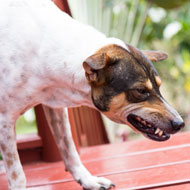
Women and dog owners better at the task
Humans can decipher a dog’s emotional state by the sound of its growl, according to a new study.
Published in Royal Society Open Science, the study also found that women are more capable of working out the meaning of a dog's growl than men.
In the study, researchers from Eötvös Loránd University, Hungary, played recordings of growls from 18 different dogs. The growls were from dogs guarding food, dogs being threatened by an approaching stranger and dogs playing tug of war.
The researchers asked 40 adults to listen to two sets of the recordings and record their feelings about the first set on a sliding scale. The participants could rate the growls by emotions: aggression, fear, despair, happiness and playfulness.
For the second set of recordings, the researchers asked the participants to choose one of the three possible contexts (food guarding, threatening, play).
The participants correctly classified 63 per cent of the growl samples - significantly more than chance level, the researchers said. Moreover, the participants correct classified 81 per cent of the play growls, yet found it more difficult to recognise food guarding and threatening growls.
The study also found that women and dog owners performed better in the recognition task, while dog bite history of the participants had no effect.
“It is known that women have a higher emotional sensitivity, and probably this higher sensitivity can help to differentiate better context of the growls,” the authors write.
“Additionally we found that, in contrast with the case of dog barks, the individual dog-related experience had a positive effect on the performance of the participants.
“Dog owners recognised better the context of the growls compared with participants who did not own a dog, which is probably due to their extended experiences with dog growls.”



 The Animal and Plant Health Agency (APHA) has updated its online reporting service for dead wild birds.
The Animal and Plant Health Agency (APHA) has updated its online reporting service for dead wild birds.